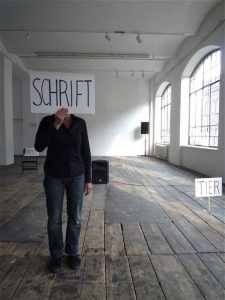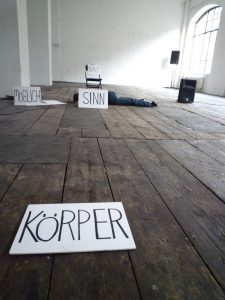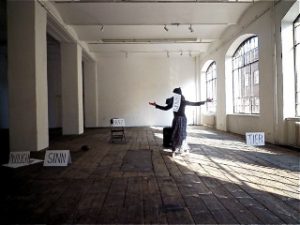approaching myself as a stranger | performance
– to investigate what she can change in her own thinking
by approaching and trying out alien knowledge – or:
a plan to approximate the life/ experience of women from the arab countries;
an exploriation of the city of vienna by visting arab, muslim institutions and associations;
a soliloquy with arab feminist literature & theory;
an entanglement of familiar, unfamiliar, ancient and current matters;
a collage of deliberations and invocations (because nothing else works).
Text and performance: Sabina Holzer
Space and advise: Jack Hauser
Input: Elke Krasny
Production: cattravelsnotalone
With kind support: Wien Kultur, ttpWUK, d.id/dance identity, Toxic Dreams, Im_flieger



In the texture of different voices and symbols, religious and political matters, things told and things imagined developed by Sabina Holzer,the distance to the other, failure to understand becomes its potential. A possibility to follow the momentary logic of poetry and to subvert premature images and definitions of alienness – directly and personally yet keeping distance.
Soundtracks: „Asshak – Tales from the desert“; „Egypt Revolution Techno Song“
Emel Mathlouti, Om Kaltoum, Muezzin 15th district Vienna.
Used texts sources of: Kathy Acker, Miral al Tahawi, Christina von Braun, Assia Djdebar, Jean Luc Nancy.
With best thanks for discussions, exchange and inspiration to Deniz Aygün, Sabile Rasiti, Roswitha Irran, Rachid Boutayeb, Franziska Tillmann, Frédéric Gies.
approaching myself as a stranger was premiered and shown at
WUK / Projectspace (’11), Tanzquartier Vienna / in the frame of „Under Protest“ (’12),
Graz ttz (’12)
Text for SCORES N°5 by Sabina Holzer, published by the Tanzquartier Wien, 2016
SCRIPT
APPROACHING MYSELF AS A STRANGER
Good evening. My name is Sabina Holzer, and I come from Europe. Europa is the daughter of the Phoenician queen Telephassa and her husband Agenor. The Phoenicians were an ancient Semitic people who mainly lived in the region of today’s Lebanon and Syria at the Mediterranean coast. Europa and her family lived in the city of Sidon, which even today is a city in Lebanon. Zeus, the father of the gods, saw her playing there on the beach and passionately fell in love with her. In order to approach her, he transformed himself into a white bull. We know the story. Europa, amazed and enchanted by this wonderful, tame animal, played with it and sat on its back. No sooner had she done so than the Zeus-bull abducted her: it leapt into the sea and swam to the far coast of the island of Crete with her, where it changed back to its true form. She bore him three sons. At the behest of Aphrodite, this foreign continent was henceforth called Europa. Thus it is written. Others maintain that this tale is an oriental one, and that Europa was an incarnation of the Babylonian-Syrian godess Ishtar or Astarte, who was often depicted riding on a bull as a sign of her power and wisdom. According to this, Europe would be a symbol for the encounter of different cultures in the countries of this region, among them today’s Turkey, Iran, Israel, Palestine, Syria, Egypt and Crete. Europa is the allegory of a bringer of culture coming from the east.
She comes and never stops coming. She asks and never stops asking. How? What? Who? How were whose words cast into which texture? What was heralded? And by whom? For who? Was it for the prophet? Or was it for al Lat, or al Manat or al Uzza, the other, the third one? Was the word in the beginning? Was it a noun or a verb? Was it heard and passed on? How was it passed on? Translated into sounds and signs? Sounding. Singing. Sawing. Seeing. Sight. Sign. Ensign, emblem, blemished.
Listed. Named.Described. Prescribed.
SCRIPT
Script.
ScScrpt. Scr. Scr. Scr. scribble. Screen. Scream. Screatch. Catch. Cr Ar’b’c w Ar’b’sque. Th’ ‘rt ‘f th’ c’rve. Th’ ‘rt ‘f th’ fl’rish.
Th’ ‘rt ‘f acc’l’rt’n and d’c’l’rt’n. L’n‘ ‘nd c’rve. Str’ght ’nd cr’k’d. …
Script. Arabic like arabesque. The art of the curve. The art of the flourish. The art of acceleration and deceleration. Line and curve. Straight and crooked.
And how long can she follow the straight line and when does it have to bend? And how does she do this in association with others? Not always in circling around, circling, straight as a ramrod. Going around. Circling. Around and around. About. Abut. About. Allowed.
Allow. Allah. Wortspiele: La il a ha il la lah. La il aha ila Allah. …
Line. Following the line. Following the line. The line however / is interrupted. Has interrupted itself. The interruption creates the possibility of being touched by something else. The interruption is / an invisible contact. It is / a secretly established contact. A secret. Secret. Interruption. Secret. Interstice. Space and secret. Spacing between the letters / between the lines. Following the line. Following the lines of the city. Following the voice in your head. Who’s talking there? Whose Balderdash?
Wortspiele: Balderdash. Alderbash. Al balderal. Le bal. Bale. Baleful. Lap. Lip. Lip service. Hold your gap. Lips. Laughter. Lightly. Lowly. Slowly. Lapps. Land. Lair, camp. Relocating people. There they lie. In the camp. Liquid laughter is no solution. Lampedusa.
Let the people in. Into the land. They left alone. Silently they come. Not only at night. Lofty knight. So light, so easy. You cannot say with levity, so frivolouzs, ridiculous. Laughable scrap of paper, as if that were life. A scrap of paper to decamp from the
camp. We’re able to accommodate them. Or aren’t we? Why not?
Out. Thinking outside.
A number of incantations, since nothing else works.
A u d i o: Collage of protestsongs
Bodies. Nothing full, no filled space. (Space is filled everywhere.) Bodies. Open space, spatial space in a sense, much more than just spacious space. Not only sites. Bodies are sites of existence. There is no existence without a site, without a “there”, without a “here”,
without a “see-here” for the “this”. The body sites are neither full nor empty. They have no outside and no inside, no parts and no totality, nor do they have functions and finitute at their command. They are all together. Aphallic and acephalic. If you can say so.
Skin, folded manifold, folded again, unfolded, replicated, invaginated, equipped with orifices, volatile, permeated, strained, released, excited, amazed, bonded, bandaged, wonderful skin. In this and thousands of other ways the body grants existence. Body existences. Corpus fictum, corpus imaginatum.
SENSE
A u d i o: “In Christianity, the head governs the body. The relation of Christ and the religious community was described as follows. The individual believers are limbs, which in Christ form an impartible body. Christ is the head of the community, the latter is a body.
The theological doctrine was transferred to the state. The king became the head of the people. This body metaphor was again directly transferred to gender relations. The head-body model imfluences matrimony and community, spirit is ascribed to the male, and
corporeality to the female. These ascriptions are reflected in the sciences, and even today influence our social co-existence. In Judaism, the female body metaphorically takes the part of the earthly house, which at the same time forms an integral part of the
community. It does not represent anomaly or that which is excluded. Naturally, such a community-forming function also implies control of the bemale body. But in the diaspora, this control rather implies great presence in the world outside the house. The “house” goes wandering, and the female body becomes the mundane correlate of the “portative fatherland”. Contrarily, the house in Islam is a permanent domicile. This still can be seen in the architecture of the cities. Living and business quarters are separated, the “openness” is directed inside, the buildings are closed towards the outside. In Islam, the symbolic house is the veil. Hijab, literally “curtain”. The Arabic language does not differentiate between partition and veiling. The Qur’an represents the “portative fatherland” of the Islamic diaspora, the veil the “portative mother country”.”
BODY
House. Habitat. Home.Homeless. No home. Nomad. Gypsy. Wandering. Meandering. Rendering. Space. Place. Spacing. Placing. Positioning. Rendering positions. Entering positions. Centering Positions. Changing Positions. Cherish Positions. Devouring positions. Distorting positions. Positioning. Posing. Losing. Choosing. Wandering. Roaming. Stay in motion first of all. House in motion. How’s emotion? Even if the motion is merely your breath’s oscillation. Just do what I’m doing: for earth, breathe in and out through the nose. For fire, breathe in through the mouth and out through the nose. For water, breathe in through the nose and out through the mouth. For air, breathe in and out through the mouth. For everything that’s invisible, breathe in and out through the nose. Very softly this time. Like smelling a flower.
– Because the place where she was born is her home. Although she tried to run away again and again. She wanted to leave the house. Away. Out of the house. Away from the house. Run. Away. Far. Nothing too close to home. Because it is closed. To closed. Being closed away. Anyway. This house, surrounded by a city of passion, is – she has to admit – what she’s most familiar with. Family. Even if other places often excited a sensation of being there which made her feel more inspired, this house is her house. The house in which she grew up and is still growing. Of course she has lived in other places, other cities, other houses, but this is the most familiar one. The most familiar one. The one that holds the largest amount of time. A place that carries childhood within. That is, time without limits. Fairy tales and patterns. Memories. Dreams.
Dar. House. Dar. Here is the house. This house she can enter. It has no door intercom, and the door can be opened. She opens the door cautiously. Only darkness behind. No signposts. No nameplates. Only the basement stairs are extraordinarily clean, and therefore she feels invited to descend them. Does she feel invited because of that? She goes down the stairs. It is wound a bit. Wounds.
– Wounds and wonders lie near each other. Does the winding, that which winds and keeps that which is to be seen from direct sight – does this winding lead to wonder? To surprise: – Ha, here I am. She is winded by it, wounded, caused to wonder, she is
bewildered. Wonder and wound. Both unexpected, often involuntary.
Down in the basement there’s some pairs of women’s shoes, quickly discarded, cast off like dice. A door is open, and from behind it somewhere in some dark spot, she hears female voices. Sweet voices, Arabic sounds, like water skimming stones. Listening to what the women tell each other. She doesn’t understand a word. Like a child in the outland of grown-ups. Sounds are uttered there, dissolving on the tongue, shaped into tones. She only understands the melody. Suddenly she hears footsteps. Caught like a thief she runs up the stairs, out into the street. Sunlight. There she’s standing now, shifting from one leg to the other in embarrassment.
One language has clashed with another within her. Explosion. Torn she is, sinking into the ground. Deeper, deeper – tunnel. At the end of the tunnel two black-clad female luminaries. Mathematicians of love. Thither. Through the 7 veils, the 7 portals.
Passing the devouring, greedy, rapacious gazes. Men, motionless, wordless, dreamless.
– She is a slave about to be auctioned. She is a djinn. A salamander dwells in her, and the violence of men cannot harm her. This is a dream. Just like a man as a soldier is bound over to instrumentalise his body in order to overcome his mortal fear –
which rarely succeeds –, she is bound over to instrumentalize her body. She depersonifies herself. She is no one’s heroine. She is everyone’s heroine. Invisible. Heroine and whore. Invisible. Instrumentalisation of the body.
BRIDE
A u d i o: “Thousands of Muslim women live under the yoke of patriarchy, locked away in their homes, helpless in the face of violence and forced marriage. Without a chance of integration they disappear in a parallel world dominated by fundamentalist d
omestic tyrants”, the magazine Profil writes. In this description one only has to replace the words ‘forced marriage’ with ‘forced prostitution’ and the ‘fundamentalist domestic tyrant’ with the pimp (or the client) in order to get a precise description of the situation of many foreign women who work in the Austrian sex industry. They, too, are “import brides” and “forced brides”, divested of their passports, and they, too, come into this country without any German language skills, and are subject to the violence of their milieu without protection. And it double violence they are subjected to, that of the pimp and that of the comsumer.” The consumer: How much does one of those actually earn here? Do they pay tax? The next consumer: If you earn 1,500 Euros a month you don’t pay tax because the annual turnover is too low. The next consumer: Some make good money, but they also
live well, and at the end of the day there’s mostly nothing left. But of course what matters is what’s left at the end of the NIGHT. The next consumer: Anyway it’s a matter of how many customers she gets. She can make a fine bundle if she isn’t so stupid as
to sell herself for a fiver.
A number of incantations, since nothing else works. Einspielung von Muezin im 15. Bezirk. Verkleidung. Hose als Turban. Gesang parallel zu dem Muezin: al-L?t, al-Manat, al-?Uz
z?, ?y?t, an-nadschm. Have you seen al-Lat and al-Uzza, and also al-Manat, the other one, the third one? Is that which is male for you and that which is female for him separated? That would be an unjust distribution then.
BEAST
The sphinx: “I keep my secret! I think and I calculate. […] My gaze, which nothing can deflect, remains spanned to an inaccessible horizon, permeating objects.” The chimera: “I gallop through the aisles of the labyrinth, I hover above the mountains, I float on the floods […] I am light and joyous! To human beings I disclose dazzling promises of paradise in the clouds and remote bliss. I pour delusion into their soul […] I seek new fragrances, bigger flowers, pleasures undreamt of.” Says the sphinx: “Oh fantasy, carry me away on your wings!” The chimera circles him “like a hyena in hear”; the “craving for copulation consumes” her. But the sphinx cannot lift off, cannot follow her. The sphinx: “Since I have thought too much, nothing remains to be said for me.” The disappointed chimera replies: “You are lying, you two-faced sphinx! Why do you always call me and then renounce me? Concealing me behind veils.” Veil. Veiling. Invisible. Trick. Feint. Fitna (chaos – worse than war). Fitna. Female. Versatile. Multiple deepening reflection. She comes and never stops coming, comes again, transforms, finds new trails, leaves traces. She never was only one, nor a unity of sense.
Body. Housing. “umm”, “umma”, “amma”, “imam”, “immat”. “Umm” mother, “umma” people, “amma” – leading with “imam” – leader and “immat”, immitting. Imitating. Imitating being. Beast. Best. Beast, here. Be here, beast! Be. Be. B. P. Pu. Pu. Puzzy. A sobriquet for the female genitals. A puzzy can see but it cannot be seen. A puzzy does not surrender, does not offer itself, does not abandon itself. Men who say that they could use some puzzy mostly find real puzzy frustrating. Puzzy. Immeasurably tender. Inevitably strong. Leaves of the rose. Red. Promise. Promise. Understanding. Desire. Perpetration. Penetration. Violence. Play. Violence. Blood. Blood. Mystery of care and time.POSSIBLE
The slave woman recounts: but the greatest pain of all for the slaves was to learn that the greatest slave trader were the slaves themselves. This is why slavery could last all those centuries and millennia. One is betrayed by one’s own people, they brand one, force one, denounce whenever their arbiter, the monarch, an anonymous corporation or the market demand it.
There always is a demand with regard to the snakes, who then snake and wriggle and wiggle and vanquish one and then apparently disappear. Of course nothing disappears. Not even dependence, which after all concerns both sides. And changing sides is not so ease. It is hardly possible.
Dependency does not have to equal submission. Dependency in fact is the most beautiful element of friendship. And at the same time dependency is the war zone of responsibility and individual responsibility. She doesn’t have any romantic illusions about that.
And sometimes she disbehaves. Behave. Haven. Having. Hanging. Falling. Falling for. I for you, you for me. My friend. Friendship. Now shipping. How are we going to do this with the words and the responses, the responsibilities, what can we give when it comes down to forgiveness, if this becomes us, regarding the past, will we take the word into our hands to be able to give it, so that it may become a gift and an action. Into the open. That’s still open. We may hope. Once, twice, thrice do something else than is our
habit. Where our habitation is. …Thank you very much.
(Sabina Holzer, translated by David Ender)
